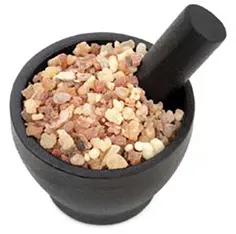
Origins of Myrrh
Myrrh, an aromatic gum resin, is obtained from trees and shrubs of the genus Commiphora, indigenous to northeastern Africa and the Middle East. This resin has a longstanding history in the production of perfume, incense, and medicine. Myrrh essential oil is distinguished by its rich, woody aroma.
Historical Background and Lore
The ancient Egyptians famously used myrrh in embalming practices. The earliest documented medical application of myrrh, as a topical treatment for wounds, dates back to a Greek text from the fifth century B.C.E. In the Bible, myrrh is famously one of the three gifts presented to the baby Jesus by the wise men, alongside gold and frankincense.
Therapeutic Uses of Myrrh Essential Oil
Health Benefits
Myrrh essential oil is beneficial for the circulatory, nervous, and digestive systems. It relieves chest congestion and coughs, either through inhalation or topical application on the chest. The oil’s astringent, antiseptic, and anti-inflammatory properties make it effective in treating wounds. When used in a hot compress, it helps draw out infections.
Personal and Spiritual Growth
Rich in sesquiterpenes, myrrh essential oil stimulates the limbic system of the brain, influencing mood. Inhaling this oil induces calmness and upliftment, fostering a sense of peace and tranquility. It aids in releasing past traumas and promotes forgiveness, essential for moving forward. Myrrh is also valuable in meditation, helping to achieve spiritual balance.
